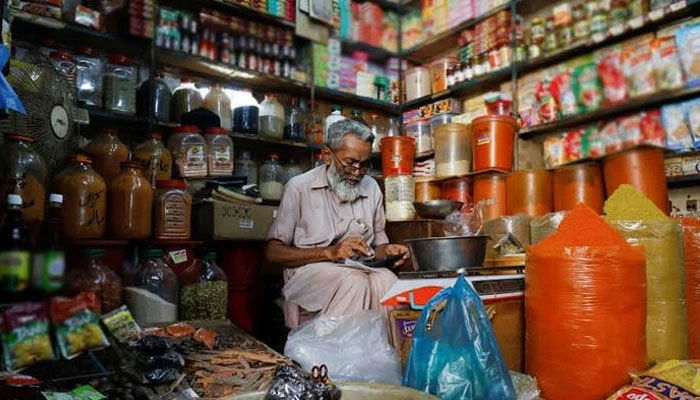FBR may tweak Tajir scheme, go after big retailers, spare small ones
FBR will now register big retailers and shopkeepers/traders on the basis of analysis of returns
ISLAMABAD: The Federal Board of Revenue (FBR) is giving indications of bringing major changes in the Tajir Dost Scheme (TDS) as it will kick-start actions against the biggest retailers based on credible information instead of collecting taxes from small retailers or traders.
The FBR will now register big retailers and shopkeepers/traders on the basis of analysis of returns, data security and commercial electricity consumption data by suspending the existing policy of fixed tax per shop/retail outlet.
This policy revision has been endorsed by the IMF or not will be the biggest question mark as the Tajir Dost Scheme failed to fetch the desired revenue collection. In the first quarter the target was envisaged at Rs10 billion and for the second quarter (Oct-Dec) period, the TDS collection was aimed to go up to Rs23.4 billion.
The FBR has agreed with the IMF for collection of Rs50 billion through TDS during the current fiscal year. Till last week, the FBR had so far fetched tax revenues of just Rs1.7 million from TDS throughout the country.
Under the revised policy, the FBR intends to register retailers based on credible information of concealment/evasion and not physical surveys of the shops. The door-to-door surveys of markets will not be carried out. The collection of fixed amounts of tax from each shop, irrespective of size, would not done under the revised policy.
The decision has been taken during a meeting held between the FBR team of members with Muhammad Naeem Mir, chief coordinator of Tajir Dost Scheme-2024, at the FBR on Tuesday.
-
 World Economic Forum CEO Borge Brende Steps Down Following Jeffrey Epstein Ties Controversy
World Economic Forum CEO Borge Brende Steps Down Following Jeffrey Epstein Ties Controversy -
 Prince Harry's Ex Chelsy Davy Makes Special Announcement
Prince Harry's Ex Chelsy Davy Makes Special Announcement -
 Dominic Evans Speaks Out After Being Accused Of Being Involved In Nancy Guthrie Kidnapping
Dominic Evans Speaks Out After Being Accused Of Being Involved In Nancy Guthrie Kidnapping -
 AI Doomsday By 2028? New Study Warns Of Global Social, Economic Disruption & ‘ Intelligence Crisis’
AI Doomsday By 2028? New Study Warns Of Global Social, Economic Disruption & ‘ Intelligence Crisis’ -
 Do Sophie And Benedict Bridgerton Get Married As Netflix Show Returns For Season 4 Part 2?
Do Sophie And Benedict Bridgerton Get Married As Netflix Show Returns For Season 4 Part 2? -
 Prince William Reveals He's 'a Little Biased' Toward One Hollywood Star
Prince William Reveals He's 'a Little Biased' Toward One Hollywood Star -
 Meghan Markle, Prince Harry Visit Special Charity On Final Day Of Jordan Trip
Meghan Markle, Prince Harry Visit Special Charity On Final Day Of Jordan Trip -
 Natalie Dormer's Reaction To Sarah Ferguson's Epstein Links Resurfaces After 'The Lady' Release
Natalie Dormer's Reaction To Sarah Ferguson's Epstein Links Resurfaces After 'The Lady' Release -
 Did You Know Famous Windows 10 Background Was Shot In Real Life? Here's Story
Did You Know Famous Windows 10 Background Was Shot In Real Life? Here's Story -
 Pete Davidson's Baby Mommy Elsie Hewitt Reveals Why She 'hated' Being Pregnant
Pete Davidson's Baby Mommy Elsie Hewitt Reveals Why She 'hated' Being Pregnant -
 Harry, Meghan Show Royal Family How To Make Impact Without Public Money
Harry, Meghan Show Royal Family How To Make Impact Without Public Money -
 Hillary Clinton Set For Deposition Before House Committee Today In Jeffrey Epstein Investigation Case
Hillary Clinton Set For Deposition Before House Committee Today In Jeffrey Epstein Investigation Case -
 Samsung Galaxy S26 Ultra Debutes With Display That Blocks Side Viewers
Samsung Galaxy S26 Ultra Debutes With Display That Blocks Side Viewers -
 Fans In Shock As 'Smiling Friends' Creators End Cult-favourite Sitcom On Adult Swim: 'They Did It On Purpose'
Fans In Shock As 'Smiling Friends' Creators End Cult-favourite Sitcom On Adult Swim: 'They Did It On Purpose' -
 Meghan Markle Accused Of Mimicking Kate’s Iconic Style On 'pseudo Royal Tour'
Meghan Markle Accused Of Mimicking Kate’s Iconic Style On 'pseudo Royal Tour' -
 Social Media Addiction ‘like Smoking’: Mumsnet Calls For Under-16s Ban With Cigarette-style Warnings
Social Media Addiction ‘like Smoking’: Mumsnet Calls For Under-16s Ban With Cigarette-style Warnings




